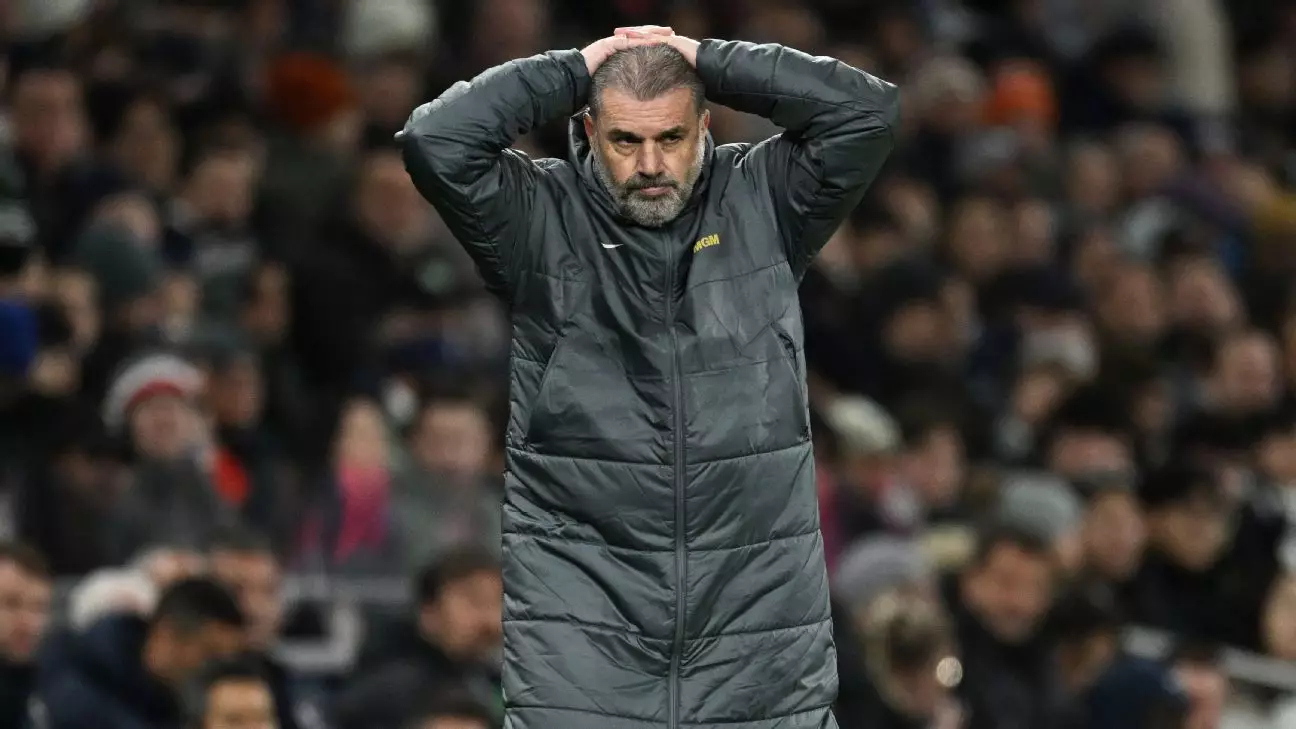In the dynamic world of football, coaches often find themselves navigating complex, high-pressure environments that can crumble even the most stoic of leaders. Ange Postecoglou, the Australian manager at Tottenham Hotspur, stands at a crossroads following a series of disappointing results, including a tumultuous 4-3 loss to Chelsea. Faced with mounting pressure from fans and the media alike, Postecoglou’s recent comments reveal his resolve to stick with his attacking philosophy while grappling with a squad riddled by injuries.
The encounter against Chelsea increasingly appeared to be a microcosm of Tottenham’s season. Initially seizing control with an impressive two-goal lead within the first quarter of the match, the team’s momentum was shattered as Chelsea roared back, showcasing their own attacking prowess. Sancho’s first-half goal and subsequent penalty decisions that favored Chelsea ultimately exposed vulnerabilities within the Spurs’ defense—a stark contrast to the early promise displayed in the match. This game not only reflects the sporting ups and downs but serves as a significant point of contention among the supporters, many of whom expressed their dissatisfaction through boos as they left the stadium.
Postecoglou’s approach to managing the team under such difficult circumstances illustrates his resilience and unwavering commitment to his vision. As he noted in a recent press conference, he believes in the conviction of his squad’s abilities, despite the limitations imposed by injuries and fatigue. Losing key players like Cristian Romero and Brennan Johnson to untimely injuries compounds the challenges faced by the team, making the task of rotating players all the more difficult. These setbacks undoubtedly hinder tactical flexibility and impact performance levels.
In this fragile state, Postecoglou’s words offer a glimpse into his strategy moving forward. He emphasizes the importance of maintaining a strong team spirit and collective belief in their capabilities. This perspective urges the team to embrace their challenges head-on, which is critical not just for morale but also for the psychological stability necessary to navigate a tumultuous season.
As is typical in high-stakes sports environments, the response from fans to poor performances has been swift and unforgiving. With Tottenham currently languishing in 11th place in the league, seven points adrift of the sought-after top four, frustration is palpable among supporters. Their commitment to the club is unwavering, yet the ongoing disappointments lead to a growing sense of resignation. The echo of boos at the final whistle signals a growing impatience, and this ultimately places Postecoglou under the spotlight—raising questions about his viability as the manager during this crucial phase of the club’s campaign.
While Postecoglou remains optimistic, addressing the fanbase is a delicate task, one fraught with the risk of alienation. Hence, he must articulate a compelling vision for the future while acknowledging present shortcomings. Navigating this tightrope is as much about building rapport with the fanbase as it is about tactical intricacies on the pitch.
To complicate matters, Postecoglou has also shared frustrations regarding officiating in the modern game, particularly in relation to VAR technology. He criticized the hesitancy displayed by officials in making definitive decisions, suggesting a broader crisis of confidence within the refereeing community. His remarks underscore the persistent debate surrounding the effectiveness and influence of technology in football, drawing attention to how it often creates an environment where decisions are neither decisive nor satisfying for players, coaches, or fans.
The issues around VAR also contribute to the team’s woes, as players become increasingly aware that even the smallest infringement may come under scrutiny, leading to an atmosphere of uncertainty. Postecoglou’s acknowledgment of these officiating challenges reveals his understanding of the broader landscape of football, where administrative and procedural elements affect the outcome of games.
Ange Postecoglou’s journey with Tottenham Hotspur amidst the current adversities reflects the complexities of modern football management. Balancing the urgency for results with nurturing player confidence presents one of the greatest challenges a coach can face. While injuries and external setbacks become focal points for frustration, the return to form must hinge on a collective belief in their philosophy, enhanced by effective communication with fans and stakeholders. The road ahead remains daunting, yet it is fraught with the potential for renewal and revitalization, contingent on how Postecoglou leverages the lessons learned from hardship to rejuvenate his squad’s aspirations.

